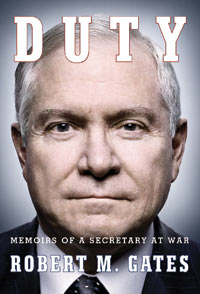Book Review: Duty: Memoirs of a Secretary at War
Robert Gates Writes About Life in Washington in His Memoir
One thing can be said about former U.S. secretary of defense Robert Gates: He traveled in the most rarified circles of Washington, D.C., for a very long time, which surely speaks not only to his political and bureaucratic skills but also to the fact that he was a safe, reliable, and noncontroversial figure, acceptable to both political parties.

With Duty: Memoirs of a Secretary at War, Gates, who left office in 2011, has turned memoirist, producing more than 600 pages about his experiences in the Bush 43 and Obama administrations. Significant players of recent American history are here: Bush, Cheney, Rumsfeld, Petraeus, Rice, Hillary Clinton, Biden, and Obama, as are the wars in Afghanistan and Iraq.
Political memoirs must be read with a boulder-sized grain of salt because politicians and high-ranking government officials typically write with one eye on a contemporary audience and the other on history, with the aim of burnishing, protecting, or rehabilitating their reputation for the day — 10, 20, or 40 years hence — when the story of their time is told. Gates is no different.
But one problem for someone who has been in Washington as long as Gates is that during his travels through the CIA, the National Security Council, and the Pentagon, he left tracks. There’s evidence in the record that Gates was less than candid when he testified before Congress about the Iran-Contra affair way back in 1987. During those hearings, Gates, like others in Ronald Reagan’s inner circle, developed amnesia for dates and names and meetings and who gave what orders. This is where that big grain of salt comes in handy.
Like most of the major figures in the administration of Bush 43, Gates is reluctant to admit that the invasion of Iraq in 2003 was a blunder of gigantic proportions, though he does concede that the war carried a monumental cost in human lives and money. Like most of the Washington establishment, Gates publicly supported the invasion in 2003.
When it comes to the war in Afghanistan, Gates remained a believer in the righteousness of America’s cause nearly a decade after U.S. forces landed. That the U.S. failed to subdue the Taliban or win the hearts and loyalty of Afghans didn’t dissuade him; he still believed in the mission and the rectitude of American troops. Even when events on the ground went wrong, year after year, the U.S. military brain trust of which Gates was a part insisted the strategy was right.
“The United States was engaged in two major wars every single day I was secretary of defense for four and a half years,” Gates writes. While true, historians should question his use of the word “major” to describe two conflicts against nations that never attacked or posed an existential threat to the United States.
4•1•1
Robert Gates will discuss Challenges Facing the United States Thursday, March 19, at 8 p.m., at the Granada Theatre (1214 State St.). For tickets, call UCSB’s Arts & Lectures at (805) 893-3535 or the Granada box office at (805) 899-2222.



